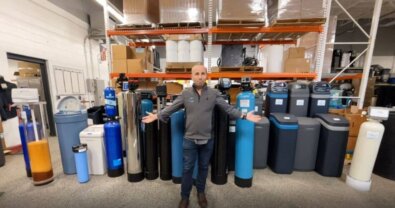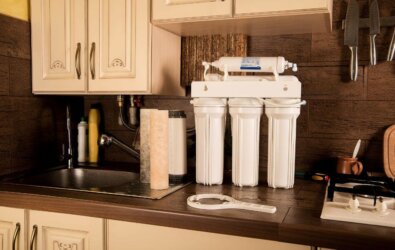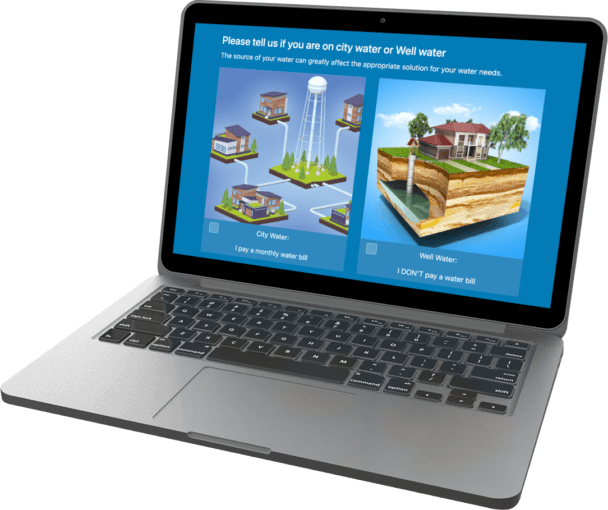Kildeer Water Softeners: How to Avoid Buying the Wrong Water Softener!
In this blog, you will learn:
Kildeer water softeners are essential for eliminating hard water from the home.
There are three main types of water softeners: ion exchange systems, salt-free systems and reverse osmosis systems.
The most important factors to consider when buying a water softener are where it was manufactured, NSF certification, warranty coverage and the trustworthiness of the dealer.
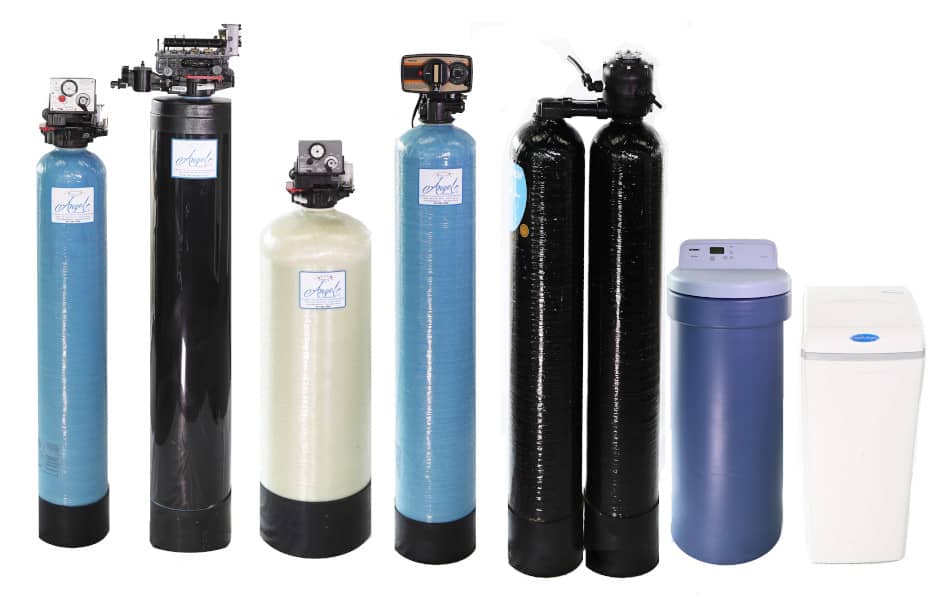
Here’s What to Consider When Shopping for Kildeer Water Softeners!
Deciding whether to purchase a water softener comes with a lot of uncertainty. We at Angel Water get that! After all, we regularly receive calls and emails from residents of Kildeer, IL, and the surrounding region expressing this uncertainty.
They ask things like:
- How does a water softener work?
- What does it remove?
- How long will it last?
- And how do I know which water softener to buy?
These are all good and important questions, which is why we’re taking the time to answer them here! Read on to learn everything you need to know when shopping for Kildeer water softeners.
Do I Need a Water Softener in Kildeer, IL?
Before we get into the details about water softeners, let’s take a step back and ask why you’re purchasing one. After all, a water softener is a significant investment. No need to spend money on something you don’t need!
So, why are Kildeer water softeners necessary? Because they eliminate a common problem in our region: hard water.
Understanding Hard Water
Hard water is water that contains high concentrations of calcium and magnesium. It collects these minerals as it flows through limestone, chalk or gypsum. These rocks are quite prevalent in the Northern Illinois region. So, much of our groundwater is naturally hard.
Homes with Well Water Usually Have Hard Water
Like many homes throughout our region, homes in Kildeer get water from a private well system. Since this water comes into the home untreated, it often contains hard water minerals. However, even treated city water is not immune to hardness.
The fact is it’s very easy for water to collect calcium and magnesium ions on the way to your faucet. Therefore, it’s crucial to invest in a water softener if you want to keep hard water out of your home.
Hard Water Creates All Sorts of Problems
Fortunately, consuming hard water is not a health hazard. It is also safe to bathe in and clean with. So, why should Kildeer residents want it out of their homes?
To put it simply, it’s annoying!
Hard water creates all sorts of headaches for Northern Illinois homeowners. In some cases, these problems can even end up costing you money!
Here are just a few of the problems it can cause:
- Foggy dishes and glassware
- Faded clothing
- Scale buildup on plumbing
- Dry, itchy skin
- Dry, brittle hair
- Reduced lifespan of your water heater
- Appliances that use water to break down
Hard water creates these problems by leaving behind its excess calcium and magnesium. This is the white scale you’ll see on your shower head or faucet.
There’s no doubt this is irritating. Plus, it can also be embarrassing when you have company over, and they see your foggy glasses and scaly sink. Fortunately, a quality water softener can make these problems history!
Water Varies in Hardness
Of course, not everyone has the same experience with hard water. Some homes simply have more grains per gallon than others. So, the hard water symptoms can vary in severity.
Determining the hardness level of your home’s water is crucial when choosing the right water softener for your home. After all, different units can handle different grain loads.
We recommend getting your water tested by a reputable company. Once you have the test results, you can use them to help you decide which water softener to choose. We will discuss how to use these results to pick the size of your unit below.
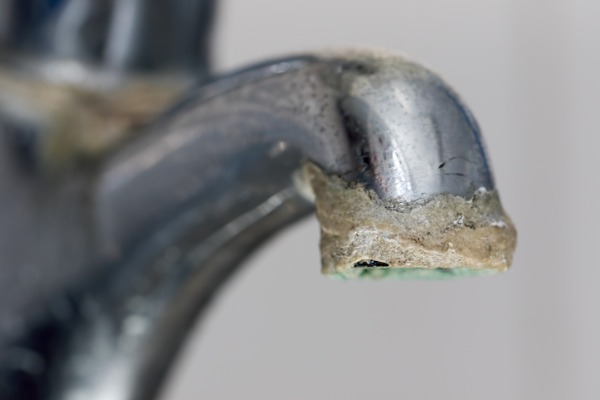
How Does a Water Softener Work?
All water softeners work to either remove or neutralize hard water minerals. Exactly how a unit works will depend on what type of water softener it is.
There are three main types of water softeners: ion exchange softeners, salt-free conditioners and reverse osmosis filters. Let’s take a look at how each of these softeners gets the job done.
Ion Exchange Water Softeners
An ion exchange system gets rid of hard water minerals by replacing them with sodium or potassium chloride.
The system consists of two tanks and a control monitor. One of the tanks contains resin filter material, and the other contains a brine solution of water and salt.
Here’s how the system works:
Hard water flows into the resin tank and through the filter material. The negatively charged resin beads attract the positively charged calcium and magnesium ions and remove them from the water. The system then pumps the newly softened water out of the tank to be distributed throughout the home.
Of course, the resin beads can only attract and hold onto so much calcium and magnesium. After a while, they need to be cleaned so that they can maintain their effectiveness. This process is called regeneration. That’s what the other tank and the control monitor are for.
The control monitor keeps track of when regeneration needs to happen. When the time comes, it begins the process by backwashing the tank to eliminate any dirt or debris. Then it sucks the brine solution from the brine tank into the resin tank. As the brine solution interacts with the resin beads, it causes them to release the calcium and magnesium ions and accept the sodium or potassium chloride ions contained in the brine solution instead.
NEW! Stop Wasting Money!
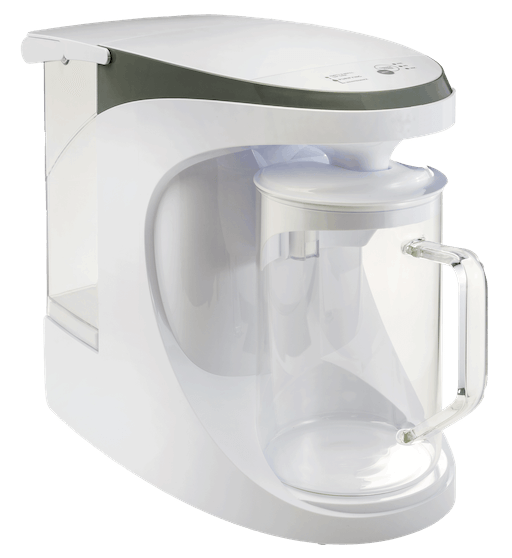
Are you spending money every month on Bottled Water for your home or office? That adds up quickly and with inflation, it’s only going to cost more tomorrow.
With the NEW purAsure Counter top Reverse Osmosis System you never have to pay for another case of plastic bottles! Get yours before the price goes up and Enjoy cleaner, healthier water on demand!
Thus, the brine removes the calcium and magnesium from the resin beads. Then the system flushes that brine away. What’s left are recharged beads, ready to create more soft water!
Salt-Free Water Conditioners
One problem people often have with ion exchange systems has to do with salt. The systems require periodic salt replacement to keep the brine tank full and functional. And no one likes lugging heavy bags of salt around and pouring them into their softeners! Some people also don’t like the extra salt because they have low sodium diets.
As their name indicates, salt-free conditioners eliminate this problem. Instead of using sodium to remove the calcium ions, these systems crystalize the ions, making them stick to the water droplets. As a result, the calcium can no longer form scale inside plumbing pipes.
While it’s certainly nice not to have to worry about calcium scale clogging up your plumbing, this is the only benefit salt-free conditioners provide. And we want to emphasize that they only prevent scale within the plumbing. Once the water droplet hits the air, the calcium de-crystalizes and can cause all the rest of the hard water problems we listed above! So, you’ll still have itchy skin, foggy dishware and unsightly white marks on your faucets. But at least you won’t have scale inside your plumbing.
Therefore, we would not recommend purchasing a salt-free system if your goal is to eliminate all hard water symptoms. But if you are only worried about scale inside your plumbing, then this is the type of system for you.
Whole House Reverse Osmosis Systems
Another option for softening your water is a whole house reverse osmosis (RO) water filter. This system removes the calcium and magnesium throughout the home by filtering the water through a semi-permeable membrane.
RO filters are just as effective as ion exchange systems, with the added benefit that they can also filter out harmful contaminants. These pollutants include lead, chromium-6, iron and many more commonly found in Kildeer and the Chicagoland region.
Of course, whole house RO filters are also more expensive than ion exchange systems and require more maintenance. They also take up more space in the home. So, if you don’t need any of those extra filtration benefits for your home, you may be better off with an ion exchange water softener.
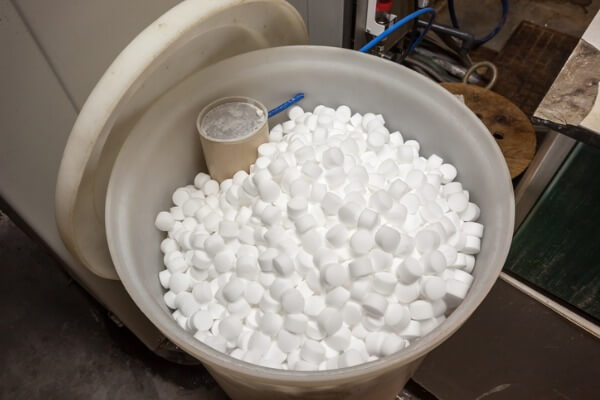
How Do I Know Which Water Softener to Buy?
So, you’ve decided what type of Kildeer water softener is best for your home. Now what? The next step is to pick the right system for your needs.
Of course, this is easier said than done with so many different water softeners on the market today. To choose the best water softener, you’re going to need to know the most important factors to consider. We can help you with that!
Here are the key aspects to consider when shopping for Kildeer water softeners:
Where It Was Manufactured
Whether or not your water softener was manufactured in the United States makes a big difference. If you buy an American-made system, then there’s a much better chance it will last.
Unfortunately, many water softener manufacturers have outsourced their manufacturing to China. They do this because it’s more cost-effective to use less expensive Chinese tanks and resin on their units. Unfortunately, these materials don’t go through the same rigorous quality inspection process that American-made products do.
As a result, water softeners manufactured outside the US lack the trustworthiness and longevity of American-made units. Many will last only 2-3 years at most, while a quality softener from the US will last 10-20 years.
So, it’s certainly tempting to purchase a unit with Chinese parts because of the relatively low price. However, we would caution you against it if you’re looking for a water softener that will give you lasting results.
NSF Certification
So, how do you find an American-made water softener that will last? The most important indicator of quality is NSF Certification. An NSF-certified softener meets the strict standards for public health protection put in place by the National Sanitation Foundation. These standards include both how well a unit operates and whether it produces safe water for consumption.
So, if you’re looking for a unit that will give you proven results, look for the NSF logo.
Warranty Coverage
You should also pay attention to warranty coverage. Some models on the market only have warranty coverage for certain parts of the system. For example, some Fleck water softeners only have a warranty for the control monitor valve on the unit. This is because Fleck only made the control monitor. The rest of the unit (i.e., the tanks) were added by other companies. And oftentimes, companies will use cheap equipment to do this to sell the unit for less money. So, be careful to pick a unit consisting entirely of trustworthy parts.
Ultimately, if you’re looking for a trustworthy softener, we recommend an NSF-certified brand like EcoWater. EcoWater units come with long-term warranty protection and won’t decrease the water pressure in your home. Most importantly, they’ll give you the soft water you’re looking for for a long time!
Reputation of Distributor
Finally, you should also do some research on the company selling you the softener. Sadly, there are many disreputable dealers out there willing to sell you low-quality equipment. Even worse, if an incompetent dealer incorrectly installs your unit, it could have adverse effects on your health! Poorly installed water softeners can cause harmful illnesses like Crohn’s disease, so make sure your installer knows what he or she is doing!
But how do you find a trustworthy water softener distributor in Kildeer? There are a few things to look out for. First, make sure that they are a licensed plumbing company. This credential indicates they know what they’re doing when it comes to protecting your family’s health. You should also look up reviews for the company online and ask around. Usually, the best company’s reputations will precede them.
Need Expert Assistance with Kildeer Water Softeners?
We hope this guide has helped quell your uncertainties about purchasing Kildeer water softeners. If you have more questions or need assistance picking a unit, give us a call at 847-382-7800! Our licensed experts would be happy to guide you through the process.
If you want help right now on your computer, try our Water Wizard! This is a free interactive tool that can help you determine the right system for you based on your needs. We hope it helps you and your family get the healthier water you deserve!
Interested in a Water Softener System for Your Home?
You don’t have to live with a dry, itchy scalp and brittle hair anymore! It would be our pleasure to help you find the right water softener to make your showers enjoyable again.
Please give us a call at (847) 382-7800 or visit our water softener page to learn more.
